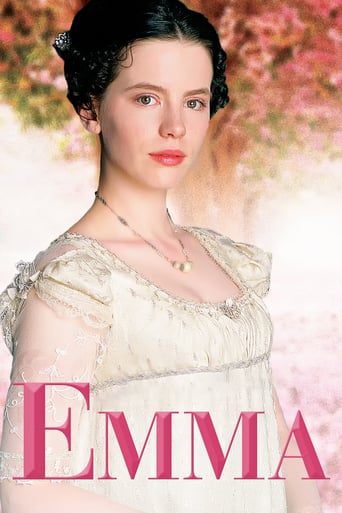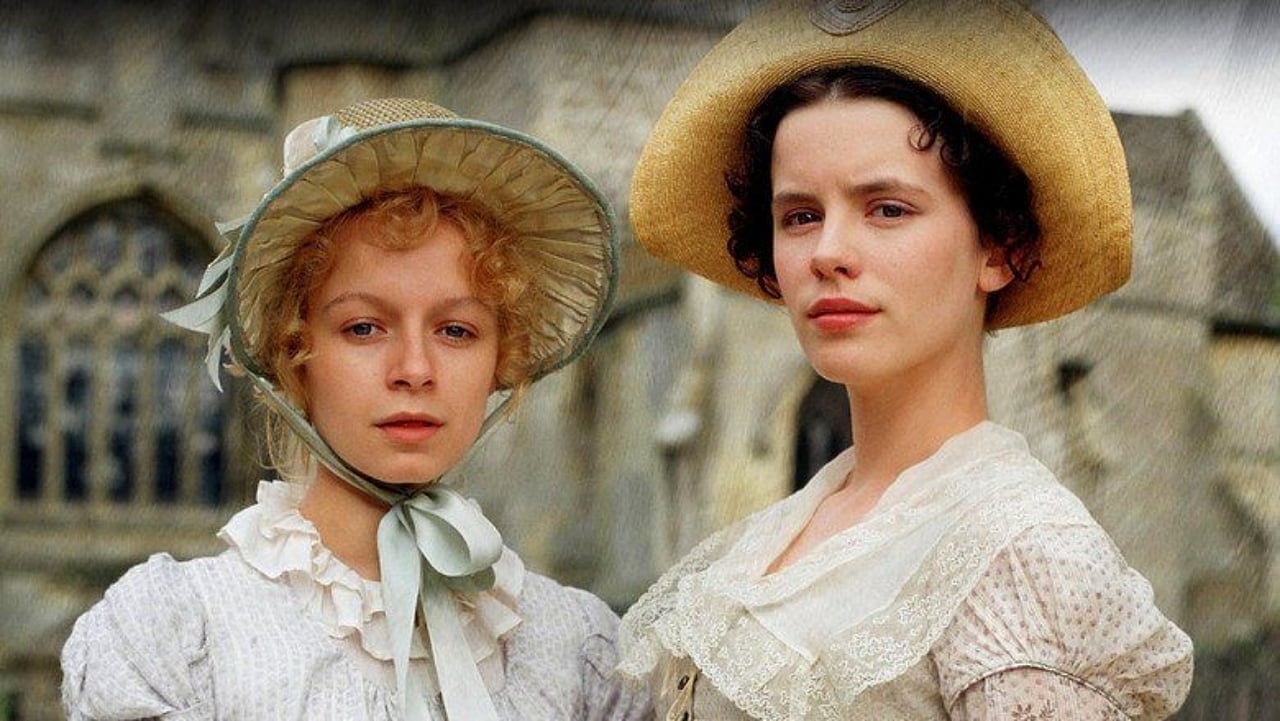David Joseph Smith
The character of "Emma" is Jane Austen's least mature and least wise of Austen's heroines. Unlike Elizabeth Bennet, for example, Emma Woodhouse comically imagines herself as other than what she is and other than others perceive her. The story depends on her foolish judgments of others and herself. The ensemble is superb - confident performances that subtlety create a canvas that contrasts the decorous with the foolish. Mr. Woodhouse, Emma's father, steals every scene he is in. So funny. My favorite performance was Mark Strong's "Mr. Knightley." Strong's performance in "Emma" was, for me, what Colin Firth's was, as Mr. Darcy, in "Pride and Prejudice." Spot on. My only disappointment with the production was with Ms. Beckinsale's "turning" at the end of the story. Her character is supposed to discover something about herself that should have been foreshadowed from the beginning of the story. Ms. Beckinsale's epiphany was, however, unsatisfying. It must be difficult to portray such a metamorphosis. I've seen 2 other productions and their "Emmas" were no more successful and, perhaps less so. You see, I've watched this production 3 times and will do so again and no other. Well done. Well done, indeed.
buzzerbill
I confess--Emma, in my opinion, is the single greatest novel ever written. It is as close to perfection as any mortal creation can be. Jane Austen reaches the pinnacle of her art here.Unfortunately, this is at best a palimpsest.Comparison to the Gwyneth Paltrow version is inevitable--that version is far more faithful to the witty spirit of the book and far more enjoyable to watch.There are some good elements here--Kate Berkinsale (having previously played Flora Poste in Cold Comfort Farm, clearly Emma's smarter spiritual twin) is a wonderful Emma. Raymond Coulthard makes an appropriately decorative Frank Churchill. The production is handsome, but the interiors are far too dark.However, there are several major problems. The first is Mark Strong--first of all, he doesn't look right for Mr. Knightley. This is perhaps because he plays the role like a censorious Victorian parson. It's badly out of tune.The second problem is one of length. Simply put, the film is much too short--to get the right kind of feel, it would need to be twice as long.Finally, and most significantly, there is the quality of the adaptation. Austen is an adapter's dream--all the dialogue is there already. It only needs to be pruned down and arranged properly. Andrew Davies seems to think otherwise. First, this is a rather gloomy film, and the last thing Emma should be is gloomy. More significantly, Davies has seen fit to rewrite the ending as some sort of bucolic feast. What planet, or minor work of Thomas Hardy, is this come from? It is utterly out of the style and spirit of the novel. And I believe that it is hugely presumptuous to try to make improvements upon--perfection.Watch the Paltrow version, or watch Kate in Cold Comfort Farm.
Matador07
Well, having read the book and seen the Paltrow theatrical version, I finally decided to seek out this lesser known version, largely just because it stars one of my favorite actresses in Kate Beckinsale.My feelings were mixed. I in fact nearly turned the movie off in the early going as it got off to a rushed and muddled start, handled the entire Elton/Harriet thing very poorly, Kate seemed to be feeling her way through, and Knightley was nearly unrecognizable.However I changed my mind and returned to it, and am now modestly glad I did so. Kate seemed to get a better handle on her role, and grew stronger throughout the movie, the support characters likewise settled in, and in the Jane/Frank relationship in particular there was so much more justice done to it and those characters than in the theatrical Emma as to almost justify watching this version on those grounds alone.On the other hand, this version was hamstrung by a critical lack of chemistry between its leads, and indeed a blunt, loud, and almost rude take on the Knightley character which rendered him completely unlovable by virtually anyone, let alone Emma. There is just no spark there, or anything close. Not only no chemistry, but no charisma of any kind. When Emma says to her window "I love him", if I had not read the book I think my response would have been "WHAT???" Even worse might be his proposal the next day when the script writer decided that it would be romantic for him to inform the woman he wants to marry, in the midst of the proposal, that he remembers holding her in his arms when she was three months old. Which is just flat out creepy, and nothing that Austen ventured let me assure you. Maybe he could tell her about the time he changed her diapers too to complete the seduction.So overall, not great, but not bad. Having seen both I am still of the opinion the Paltrow version was the stronger -- despite its excessive cuteness, it was well constructed and seemed to have a good idea of what it wanted to be and say. The characterizations in that version are in general stronger and more vividly painted, and it also had a sense of humor, which while perhaps not 100% Austen's, at least bettered the dourness often at display in this version. But this version had its charms too, although they took a while to manifest themselves. Kate started slow but settled in and was charming by the end, and several minor characters were rescued from obscurity (Jane and Frank were particularly well done).P.S. As an aside, I think the theatrical version's decision to use voiceovers of Emma's thoughts worked better and was more clear than the dream/fantasy sequences attempted here. In such an internalized book, some such device needs to be utilized to make up for all of Emma's thoughts and opinions that the viewer no longer has access to, but the voiceovers had much more personality without breaking up the flow of the movie.
aiu
I believe that this adaptation deserves a much lower grading than the Hollywood adaptation with Gywneth Paltrow, since it doesn't manage to portray any of the Austen's subtle wit and humour, and it does not bring onto screen any likable characters. K. Beckinsale's Emma is a spoiled, self-righteous girl, without the softness or humour of G. Paltrow's Emma. M. Strong's Knightley is a harsh brooding person, without the wit or gentleness of Northam's Knightley. The atmosphere is also rather gloomy: the scenes filmed in the dark, the thieves episode, the more obvious presence of servants in the story. The script might be closer to the book regarding the details, but it is certainly far from the luminous and satiric spirit of Austen. Everybody seems to take him/her-self much more seriously here, and Emma seems never to realize that she is prone to mistakes as any other human being; she preserves that self-righteous feeling until the end of the movie.



 AD
AD




